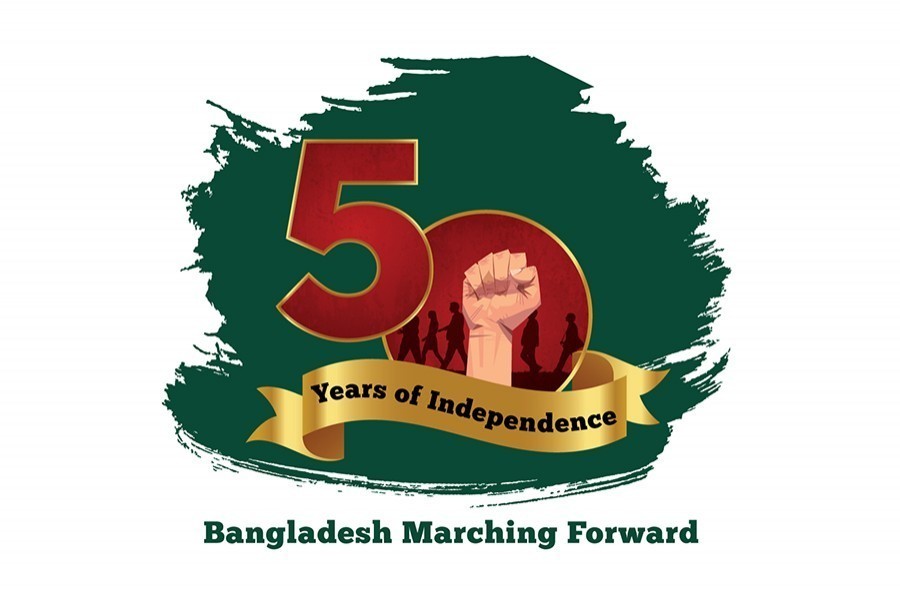The Bengalees in their newly independent country 50 years ago dreamt of a new journey. After a 24-year rocky ties with the Pakistan state's western wing, they got themselves severed from the frame of that state entity. They emerged an independent and sovereign state, democratic in character and based on four principles of a modern, progressive statehood. Born after a 9-month Liberation War in 1971, the People's Republic of Bangladesh rejected the baggage of all concepts of the British colonial and Pakistan eras. It hadn't taken long for its front-line leaders, especially the architect of the Bengalee nationhood --- Bangabandhu Sheikh Mujibur Rahman --- to realise that East Bengal couldn't get along with Pakistan.
In order to keep itself separate from the 1950s' liberalism of the Republic of India, then led byJawaharlal Nehru, Pakistan centred itself on a pseudo-democraticmodel. Its state policies pitted the non-Bengalee population of the western wing of Pakistan against the East Pakistanis. The latter used to take enormous pride in their distinctive Bengalee nationhood. The territory was inhabited by a race separate from the non-Bengalees in all respects --- beginning from language, cultural traits, food habits, ethos and many other details of nationhood. The common feature that was made to use to bind the two state-wings was the common religion of Islam. Thanks to the feeling of superiority demonstrated by the West Pakistani military-oligarchic clique, it took a couple of years for the Bengalees to realise that an 'improvised' nation like Pakistan cannot last long. And it proved true with the sowing of the seeds of the Bangla Language Movement in 1948, before it took the shape of the student-masses protest against the West Pakistan's unilateral and arrogant declaration: "Urdu and Urdu shall be the state language of Pakistan, and no other language." After the killing of the Dhaka University students demanding that Bangla be declared the state language of Pakistan, the fate of Pakistan hadbeen sealed. The Language Movement continued to be followed by one mass upsurge after another throughout the 1960s. In fact, from the day of 21st February, 1952, the united Pakistan stayed in place for 19 years only.
In the later decades, socio-political analysts in both Bangladesh and India observed that it was mainly the Bangla or Bengalee-phobia of West Pakistan's political-military-oligarchic clique which worked as the catalyst to the state's eventual breakup. Another section of analysts believes that the common Muslim Bengalee citizens and those from other religions in East Bengal were hoodwinked into believing that 'Pakistan' would serve as the panacea for all the socio-economic woes of the eastern Pakistan. To the disillusionment of these people, the Pakistani central leaders delivered on just a few of these promises. As for the Muslim Bengalees, despite their adherence to the Islamic belief, they couldn't be refrained from following their age-old cultural practices and legacies. These rituals have been cutting across religious boundaries through the ages.
The paranoiac attitude of the Pakistani ruling clique towards the Bangla language and Bengali culture at one time reached an atrocious level. A few of them warranted the audacity to call Bangla a 'Hindu language'. The intellectual morons had little knowledge that the modern Bangla was the result of the joint efforts by both the Bengalee Hindu and Muslim creative people and scholars. The West Pakistani self-styled pundits proposed that the Bangla script be replaced by one written in either Roman or Arabic characters. However, linguists in East Bengal and also a few in West Pakistan simply binned the absurd idea. A great sarcasm resurfaced just after the creation of the independent Bangladesh in 1971. It comprised the oft-quoted vainglorious confidence showedby MA Jinnah: "Pakistan came into being to stay forever ….."
As the nation observes the 50th anniversary of independence, it is imperative totake stock of the gifts of the politico-national freedom. Fifty years is no short span for this nation, which gained independence fighting an all-out Liberation War --- and going through a brutal genocide that killed three million people. A few nations have managed to graduate into developing ones through employing their resolve and patriotism. However, they have an advantage. These nations are not overpopulated; and they are rich in natural resources. Had there been fewer changes in global policies, especially those of the importing countries, Bangladesh could long have started using its RMG and manpower fruitfully. Moreover, thanks to the economic slump following a series of Covid-19 pandemic outbreaks globally, the country's formal graduation into a developing nation might remain stalled for some time. But the battle-hardened nation's resolve cannot be undermined. The nation's unskilled manpower might be going through short spells of adversities --- at least for now.
At the same time, to the delight of the policymakers the online-savvy venturesome youths continue to break new grounds. Many of them have proven their genius at the previously unthought-of places like NASA and various research platforms looking for innovative youths. In the Pakistan days, the Bengalees were not just viewed as intellectually inferior to their non-Bengalee counterparts. When it came to the issue of participating in different types of international fora focused on socio-economic uplift, peace, ways to boost agro-production etc, the representation of the Bengalee experts was invariably poor.
In regional peace talks or the operation of regional development alliances like RCD, experts from the eastern wing of Pakistan were conveniently overlooked. By employing their self-styled one-upmanship and military superiority through imposing martial law, the so-called central government based in western Pakistan introduced itself as the only voice of the two-wing state.An indomitable people led by great revolutionaries and admired heroes, Bengalees were made to feel it was time they said goodbye to Islamabad.Sheikh Mujib didn't fail to declare independence at the opportune moment.


